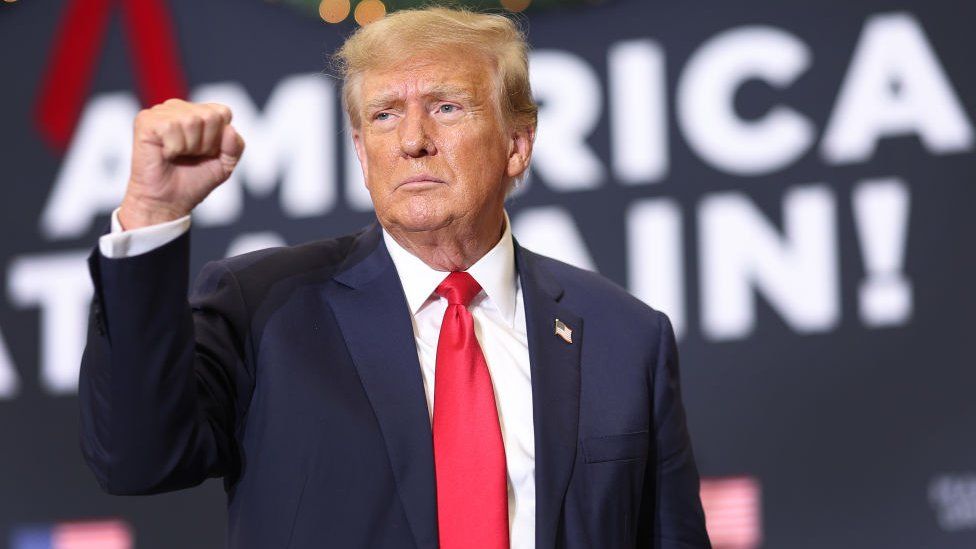After months of campaigning and debates, Iowa voters will finally get to have a say on which Republican candidate they would like to nominate as presidential candidate.
The Iowa caucuses, which have served as the lead-off voting process in presidential elections since the 1970s, will kick off on Monday.
Democrats caucus-goers will not have any bearing on the 2024 race but Republicans will vote who they want their party’s presidential nominee to be. The percentage of the votes will determine how many of the state’s 40 national convention delegates each candidate receives.
While Iowa only provides 1.6% of Republican delegates in the U.S., the state often provides a boost to the candidates who provide strong or better-than-expected performances. As the first voting event in the presidential campaign season, the caucuses can also hurt the prospects of underperforming candidates while building momentum for “winners.”
What happens at the Iowa caucus?
Iowa caucus-goers will hold a binding vote for the party’s presidential nominee at designated caucus sites and elect delegates to county conventions. The event does not require a minimum threshold to qualify for delegates.
Delegates will attend this summer’s Republican National Convention in Milwaukee, where the party’s nominee will be chosen.
The Iowa caucus voting is done with a secret ballot with no set list of candidates to choose from as voters can choose candidate they want. Some caucus sites provide pre-printed names of major candidates and a write-in option but most of the time voters write the name of the candidate on a blank paper sheet.
When are the Iowa caucuses?
The Iowa caucuses begin on Monday, Jan. 15, 2024 at 7 p.m local time.
Officials advise attendees to arrive at their caucus site early to make sure they’re registered and inside once doors open around 5 p.m.
How are caucuses different from primaries?
The main distinctions between caucuses and the primaries are the voting period time slot and voting methods.
During a primary election, voters can cast ballots at the polls throughout Election Day and can choose to cast an absentee ballot if they’re unable to make it to the pools from early morning until closing time that evening. With the Iowa caucuses, attendees must cast their ballots in-person within the evening time frame, except for a small group of overseas and military voters.
Another notable difference is that political parties run caucuses while state officials usually run primary elections.
What happened at Iowa caucuses in 2020
Democrats faced unexpected delays in results during the Iowa caucuses in 2020.
On Feb. 3, 2020, Democrat candidates saw widespread technical glitches and a struggle to decipher conflicting numbers throughout nearly 1,700 precincts statewide. The results for the presidential nomination were delayed until the next day following howls of protests.
President Joe Biden, a candidate at the time, sent a letter to Iowa Democratic Party on Feb. 3 expressing “considerable flaws” in the reporting system.
The results revealed the following day around 4 p.m. CT that Pete Buttigieg, the current Secretary of Transportation, held a slim lead over Vermont Sen. Bernie Sanders.
How do the Iowa Democratic caucuses work now?
Democrats have dramatically changed the way thee Iowa caucuses look in 2024. Instead of an in-person system, the party will hold an entirely mail-in system. Iowa Democrats can request an absentee presidential preference card, which functions like a ballot, that they can fill out and return to the state party until March 5, when results will be announced.
The Democratic caucuses will be held only to conduct administrative party business and to start the process of choosing delegates to the national conventions and express their preferences for their party’s presidential nominee.
Source: usatoday.com










More Stories
Borno woman killed over allegation of witchcraft, police arrest two suspects
VIDEO: Defiant Sowore confronts police, EFCC operatives over barricade at Federal High Court
Shehu Sani faults Senate invitation of Berekete Radio host Ahmed Isah over Akpabio, Natasha spat